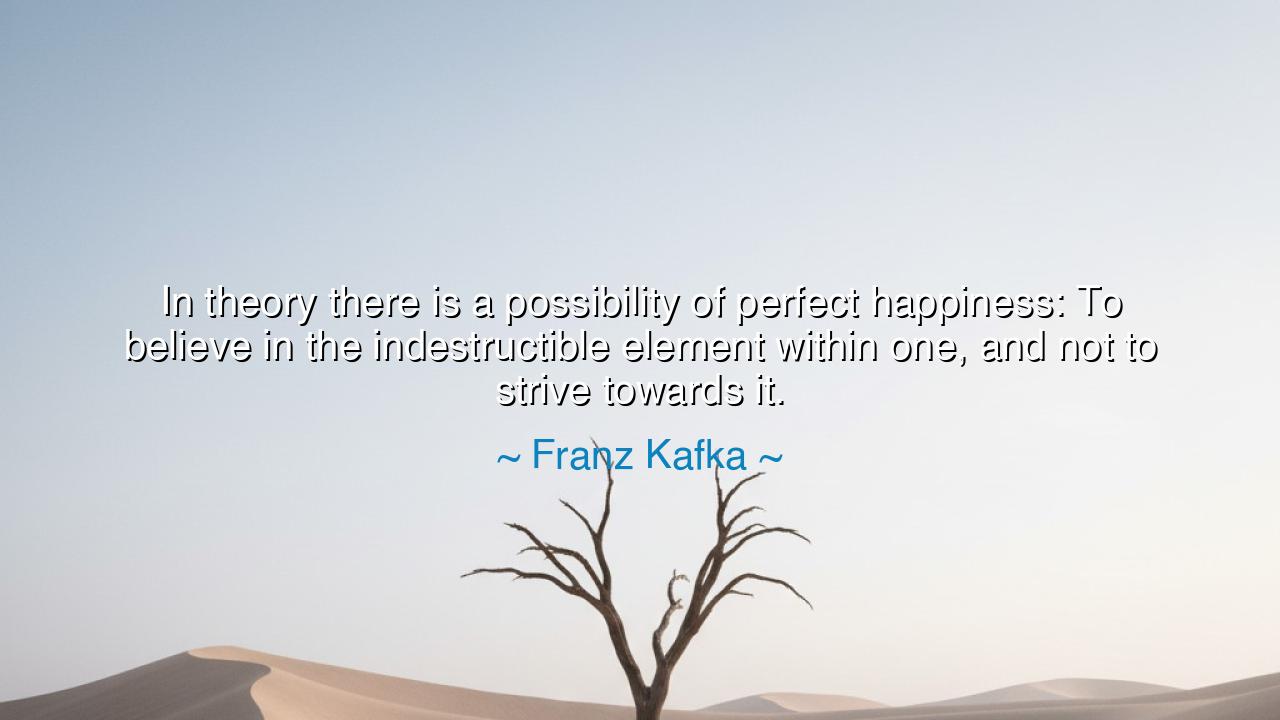
In theory there is a possibility of perfect happiness: To believe
In theory there is a possibility of perfect happiness: To believe in the indestructible element within one, and not to strive towards it.






In the quiet brilliance of his melancholy, Franz Kafka spoke a paradox that pierces the heart of every seeker: “In theory there is a possibility of perfect happiness: to believe in the indestructible element within one, and not to strive towards it.” These words shimmer with mystery, for they contain both the promise of peace and the warning of its fragility. Kafka, the eternal observer of the soul’s labyrinth, reminds us that true happiness is not earned through striving, but discovered through faith in what already is. Within every person, he says, lies something indestructible—a divine spark, untouched by failure, fear, or decay. To recognize this eternal core is to find rest; to chase it endlessly is to lose it in the dust of our own desire.
To the modern mind, trained to strive, to conquer, to achieve, such wisdom seems impossible. Yet Kafka’s paradox reflects the timeless teaching of the ancients: that the more we grasp for peace, the further it retreats. The “indestructible element within one” is the soul’s eternal essence—what the Stoics called the divine reason, and the mystics called the spark of God. It cannot be reached because it is not distant. It cannot be earned because it was never lost. The tragedy of humanity, Kafka laments, is that we seek through effort what can only be found through surrender.
In this, his thought stands beside the wisdom of Lao Tzu, the ancient sage of the Tao. “He who strives, loses,” said Lao Tzu, “but he who yields, attains.” The Tao, like Kafka’s “indestructible element,” flows quietly within all things. The more one struggles to control it, the more it slips away; the more one trusts it, the more it reveals itself. So too with happiness: when we hunt for it with restless ambition, it dissolves; when we cease striving and dwell in faith, it blossoms like a flower opening to the sun. Kafka’s perfect happiness is thus not an emotion, but a state of knowing—an awareness that our being, though clothed in impermanence, is rooted in eternity.
Consider the life of Buddha, who sought enlightenment through years of struggle, asceticism, and self-denial. He starved his body, punished his mind, and still peace eluded him. Only when he abandoned striving—when he sat beneath the Bodhi tree and let go—did illumination arise. In that stillness, he saw that the divine element was already within, and that to chase it was to run from it. This is the very essence of Kafka’s teaching: happiness is perfect only when it ceases to depend on pursuit. The act of striving affirms the illusion of distance; faith dissolves it.
Yet Kafka’s brilliance lies in his irony. He calls this “a possibility in theory”, as if to confess that such serenity is nearly beyond reach for humankind. For he knew the restless heart too well—the heart that cannot help but strive, even when told not to. His words are both revelation and lament: he shows the path, but admits how rarely it is walked. In his own life, Kafka longed for peace but found turmoil; he believed in the “indestructible element,” yet struggled to live by its quiet assurance. Thus, his teaching is not from the mountaintop, but from the valley—a cry of wisdom from one who has glimpsed the truth yet suffered from his own inability to abide in it.
Still, even in this tension, there is hope. For to believe in the indestructible, even without perfect peace, is itself an act of light. Every moment we pause in trust, every breath we take in awareness of the eternal within, is a step toward liberation. We may not live constantly in the state of perfect happiness, but we may touch it in moments of stillness, when striving falls away and the soul remembers what it is. It is not the possession of saints alone; it is the inheritance of all who dare to be still.
Therefore, take this lesson as the ancients would have taught it: Do not strive to be happy; awaken to the happiness already within you. Sit quietly, breathe deeply, and know that beneath your fears and failures, your doubts and desires, there exists something unbreakable. Trust it. When you act, act from it; when you rest, rest in it. For that indestructible element is not a prize at the end of the journey—it is the traveler, the path, and the destination all at once. To live by this truth is to find the only perfect happiness there has ever been: the peace that asks for nothing, because it has never been lost.






AAdministratorAdministrator
Welcome, honored guests. Please leave a comment, we will respond soon